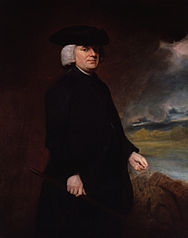William Paley
English theologian and moral philosopher
Biography
Paley was born in Peterborough in July 1743. His father, William, was vicar of Helpston, Northamptonshire, and, later, headmaster of the Giggleswick School. William attended Giggleswick prior to entering Christ's College, Cambridge, in 1759, where he had a brilliant career, excelling in mathematics and debating. After a brief period as a school-teacher Paley was elected a fellow at his college in 1766 and tutor in 1768. He remained at Cambridge until his marriage in 1776. Subsequently Paley, who had been ordained in 1767, accepted a series of ecclesiastical appointments which were less distinguished than his abilities because of his liberal political views.
Paley was the author of four books. He published The Principles of Moral and Political Philosophy in 1785. Horae Paulinae, a defense of the New Testament, appeared in 1790. A view of the Evidences of Christianity, issued in 1794, achieved great fame. Natural Theology; or Evidences of the Existence and Attributes of the Deity Collected from the Appearances of Nature was published in 1802. He died in Lincoln on May 25, 1805. Paley's most successful work was Natural Theology, which presented in a clear and lucid manner all of the evidences for the existence of God. Philosophers and theologians have always distinguished between knowledge of the fact that a supreme being exists and knowledge of what such an existence would involve. Paley, as a liberal theologian and thinker, was close to the position of medieval negative theology and 17th-century deism, believing that man can know that the Supreme Being exists but that he can know nothing of His attributes. Thus Paley attempted to establish that the evidence for the existence of God exceeds the objections. Paley's method was analogical reasoning.
His most famous illustration was that a reasonable man will admit that experience establishes that the intricate and connected parts of a watch can be produced only by an intelligent designer. If evidence suggests that the workings of the present universe are more complicated and interdependent than those of a watch, then a reasonable man must conclude by analogy, that it is highly probable that God exists as the designer of the universe. Indirectly, said Paley, a reasonable man can attribute personality and power to such a being because these are the experienced conditions of a designer. The weakness of Paley's argument consists in his failure to question the analogy between a watch and a world.


